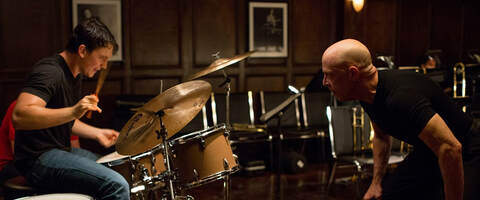A | A student jazz drummer is terrorized by his maniacal instructor. Directed by Damien Chazelle Starring Miles Teller and JK Simmons Review by Jon Kissel |

Whiplash is fantastically intense, never letting up on the viewer from frame one to the credits. The one exception is a realistically awkward first date between Neiman and Benoist, though Neiman's inability to talk about anything but his work dooms it from the start. Director Damien Chazelle films the music sessions by shrinking the world down to the few square feet the drum set sits on. He repeatedly focuses the camera on a cymbal or a quick cut to below the set, only to cut back to the front of the set where Fletcher is looming. There's nowhere to hide from him. The final ten minutes play out as a transcendent battle of wills, such that at the final cut to black, I realized I was out of breath. I had barely inhaled as it was happening. This is Chazelles's breakout film, the 2014 version of 2013’s Destin Daniel Cretton or 2012’s Behn Zeitlin, though Chazelle has spent the years since Whiplash proving he has the goods while his peers have floundered.
The intensity of the film is generated by Chazelle’s camera, but Simmons and Teller do their part. From his 90’s stint on Oz as a ruthless skinhead, Simmons has always been an intimidating presence when that's what the role calls for, but he takes it to a new level here. After his early scene, he's transformed to an ethereal presence, lurking as a shadow behind frosted doors. When Neiman gets into his band, he is revealed as a tyrannical monster. Every movement and syllable is precise, he can turn on charm or feeling when he wants to, and he can turn it off just as quickly. A kind word instantly becomes a thrown chair. Fletcher's influence corrupts Neiman, distorting eagerness and optimism into isolation and monomania. Teller plays Neiman's descent convincingly, matching Simmons's icy resolve. A mid-movie tragedy of errors is driven by Chazelle's quick cuts, but is sold by Teller's flailing anxiety. Both performances are award-worthy, as is Chazelle's work behind the camera.
The relationship between Fletcher and Neiman is rich and complicated. Fletcher's style has no place in the world, driving students from the conservatory (mostly female students, conspicuously lacking from his band) and psychologically scarring them for his own purposes. He is chasing that one great performance, and in his mind, this is how it happens. For nearly all, this is counter-productive, driving musicians who might become great from the field before they get their chance. For Neiman, who is willing to submit and fight back at the same time, a stopped watch becomes briefly right. A person's success is relative to their ambition, and for both men, their ambition is limitless. Whiplash reduces the beautiful music contained within to an objective series of notes on a page, a way to judge who is infinitesimally better than another and thus robbing music of any kind of emotional resonance. That’s not the case with Whiplash, a film that provokes an amount of panic not dissimilar from the kind caused by Fletcher looming over one of his students. This is an incredible experience, the kind that Fletcher is longing for. It's a synergy of directing, acting, cinematography, and soundtrack that combines into one of the best films of 2014. A
 RSS Feed
RSS Feed